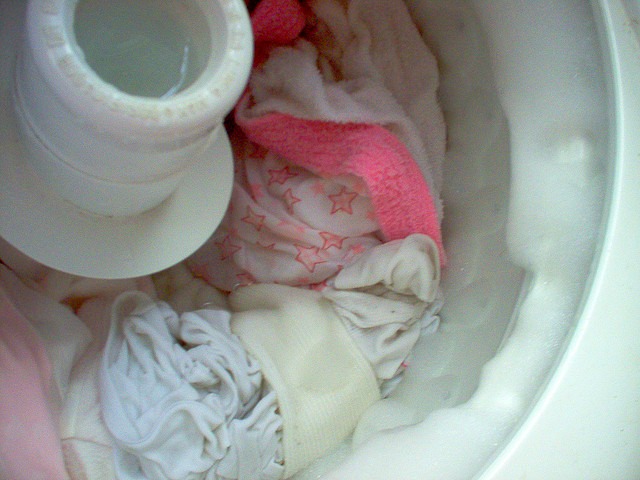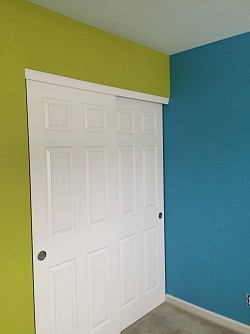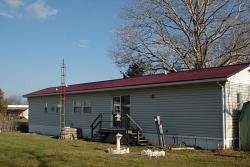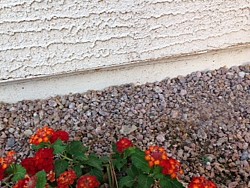The Secret of Cleaner Laundry? Use Less Detergent
 Strange but true: If you would like your laundry to come out cleaner and fresher, the secret just might be to cut down on the detergent. Using too much or the wrong kind of laundry soap may leave your clothes dingy and dull. What's more, adding in an eco-friendly household substance can boost your regular detergent's cleaning power without negatively affecting the environment. Here's how to fine-tune your washday skills.
Strange but true: If you would like your laundry to come out cleaner and fresher, the secret just might be to cut down on the detergent. Using too much or the wrong kind of laundry soap may leave your clothes dingy and dull. What's more, adding in an eco-friendly household substance can boost your regular detergent's cleaning power without negatively affecting the environment. Here's how to fine-tune your washday skills.
Use the Right Amount of Detergent
More is not necessarily better; use only the amount of detergent specified by the manufacturer. Measure it carefully with the cap or scoop provided or with a dedicated measuring cup kept in your laundry room. Don't rely on eyeballing, as the tendency is to overestimate. Besides costing you extra money, an overdose of laundry detergent will leave a residue on your supposedly clean wash.
What NOT to Use
Never substitute dish liquid, dishwasher detergent, or shampoo for laundry detergent. The former are all designed to produce a much higher volume of suds than you want in your washer. In addition to making a mess, the extra foam might actually damage the control panel of a front-loading washer (as I can personally attest to). What's more, detergents that are not expressly formulated for laundry use may discolor or damage clothes, towels, and sheets. In an emergency, if you run out of laundry detergent, you can freshen lightly soiled items by running them through a wash cycle without any added soap.
Washing or Baking Soda
Washing soda (sodium carbonate) is an environmentally friendly laundry aid. When added to your wash together with laundry detergent, it helps to remove stains caused by oil or wine, as well as softening your washer's water. Baking soda, which is more readily available, can also be used, either as is or after a DIY transformation to sodium carbonate -- AKA "washing soda". Buy baking soda in bulk, rather than in kitchen-sized boxes, to save money. Store in a dry place.
Vinegar
Plain white vinegar is just about everybody's favorite green cleaner. This hardworking liquid works to disinfect, brighten, soften, and deodorize your laundry. (In fact, it does just about everything but slice and dice.) Simply wash clothes as per usual, but add a cupful of vinegar to the last rinse cycle. Bonus use: To set the dye in new cotton clothing or sewing fabric, place in a basin, cover with white vinegar, and let soak for an hour or so before laundering.
Hydrogen Peroxide
Hydrogen peroxide is a compound of water plus oxygen, which makes a good presoak for removing blood and other stains from clothing or linens. Supplement your laundry soap with one cup of hydrogen peroxide for brighter whites, with much less wear and tear on your clothes -- and the environment -- than with chlorine bleach.
Club Soda
Long known as the treatment of choice for liquid stains such as red wine or coffee, club soda is readily available, expensive, and non-toxic. It is also excellent for deodorizing pet (or small child) "accidents" on bedding or slipcovers. Apply to the affected area ASAP and avoid rubbing, which may break down the fibers. Add some table salt for extra cleaning power. Then launder normally.
Mouthwash
Reader's Digest has the most unusual suggestion for a laundry detergent booster. They recommend battling odor-causing bacteria with a cup of alcohol-based sugarless mouthwash. Just pour it into your washing machine, together with your regular laundry detergent, to freshen a load of stinky gym socks. Makes sense to me!
A Few Caveats
Don't get to thinking that if one laundry booster is good, two or more will be even better. Once again, my personal experience has shown that vinegar and baking soda are not the best washday combination, unless you like streaks on your just-washed clothes. And avoid using hydrogen peroxide, washing soda, or chlorine bleach in a wash load that contains wool garments -- they can harm the fibers.
If your washing machine delivers consistently poor results, call a professional handyman. It's probably time to give it a tuneup.
Laura Firszt writes for networx.com.
Updated July 17, 2018.
Looking for a Pro? Call us (866) 441-6648

Plumbing Average Costs
Plumbers Experiences

Nursery Painted Just In Time To Welcome Our New Baby Boy

Come See My New Metal Roof! It Is Fantastic!



